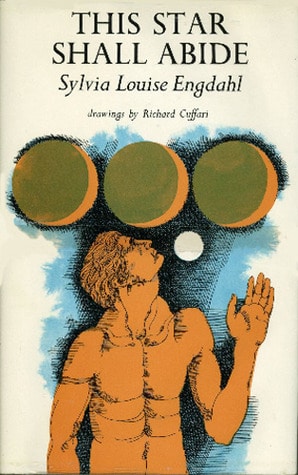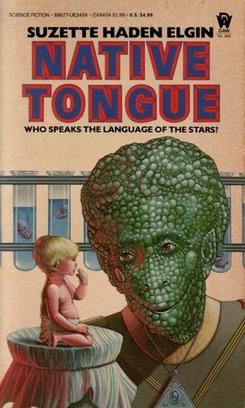Moments of serendipity have been all too rare this year – yet I had one this week when I connected with a dear and trusted colleague, a faith leader in the Christian clergy, after a meeting. Our discussion led to an exchange about representations of God in science fiction. That’s an essay for another day. But, it did get me thinking about some of the books I read growing up (I’ve always been a huge Sci-Fi fan). Having recently shared what is currently on my night table, I thought I would take you on a journey back in time to some of the literature that shaped my youth and continues to influence me today.
Mild spoilers (of forty-plus year-old novels) ahead:

To this day, I carry a vivid memory of a flight I took across the country to visit my grandparents in the late 1970’s, during which I first read Sylvia Engdahl’s This Star Shall Abide. The main character, Noren, comes of age in an agrarian medieval society – with a twist. In this civilization, there is a sacred technology, restricted to the use of a priestly class of “scholars” and “technicians”. The book’s faith system places all sorts of restrictions on day-to-day life. For example, citizens are forbidden from drinking water that hasn’t been properly blessed by technicians, and there are warnings of dire consequences for even the smallest sin against these mandates.
Noren becomes a heretic, on the run and hunted by the scholars. During his journey, he learns about the origins of his faith, its texts, and the rituals. I won’t give away the ending, but behind the sacred memories that have been transmitted through generations, Noren finds that while the faith as taught may not be entirely literal, there is purpose within the texts, a purpose that provides meaning and relevance, even for a heretic like him.

I first read another book, Suzette Haden Elgin’s Native Tongue, while in high school (and it was most certainly not on my yeshiva syllabus). It is the story of a not-too-distant future America where the Nineteenth Amendment has been repealed and women have no civil rights. It has similarities to The Handmaid’s Tale, but in this world, some women, from very select families, are allowed to work as translators in human-alien commerce and diplomacy.
Nazareth, the protagonist, is a talented translator who understands that the language we use shapes how we perceive the world around us (think, for example, of how we assign gender to objects and how an object’s gender changes depending on the language we use). In Nazareth’s world, a language created by women has the potential to be a vehicle of their liberation by revolutionizing the perceptions of a future generation of native speakers.
These novels have stayed with me, and I revisit them every few years. There are ideas here that have shaped me, and have found their way into my work and writing over the years:
- Faith can transmit deep truths without having to be literal. When we engage with both facts and stories, we find deeper meaning in each of them. We can interrogate truths without rejecting them. The boundaries between questioning and heresy, and between faithfulness and rejection, are neither simple nor fixed.
- Perceptions are informed by the languages we use and the metaphors we place in them. To translate something is to change our perception of it, and by extension our understanding of the world it connects to (for example I’ve written about what gets lost when we translate the Jewish understanding of the Ger to the Christian concept of the “convert”).
- To be open to the perceptions and stories of others, is to be able to see versions of the world that are no less true than our own. To apply meaning to someone else’s words, without first comprehending their understanding of those words, is to miss the truth of what they are saying.
These are just two of the hundreds of books I read in my youth that I continue to think about and that inform who I am. As I let my mind wander back to these memories, I am struck by the value and importance of children’s literacy. By teaching a child to read, one contributes powerfully to their future. I wouldn’t be who I am if my parents and teachers hadn’t nourished this skill and passion in me.
It is why we at JCRC are so committed to bolstering literacy in Boston area public schools and why, even during COVID, even with a loss of serendipity, the volunteers of the Greater Boston Jewish Coalition for Literacy have continued to tutor across the region, supporting the next generation of students who will look back on the books of their youth and tell those stories. It is work that I am proud of, and I was reminded of that pride this week.
P.S. Please share with me your stories and memories of the books you read in your youth.
Shabbat Shalom,
Jeremy




